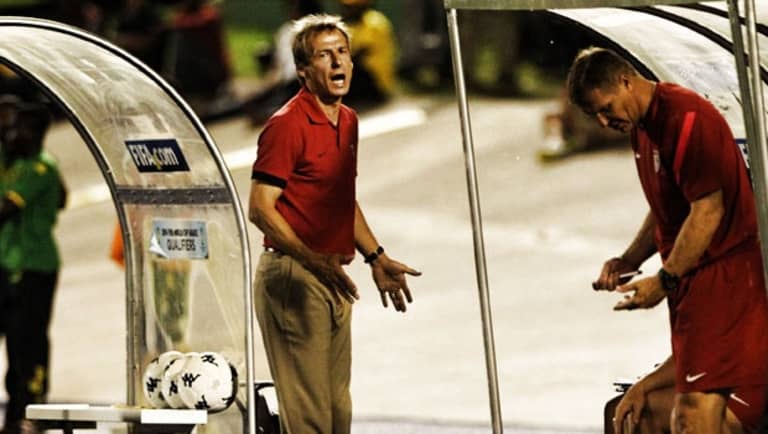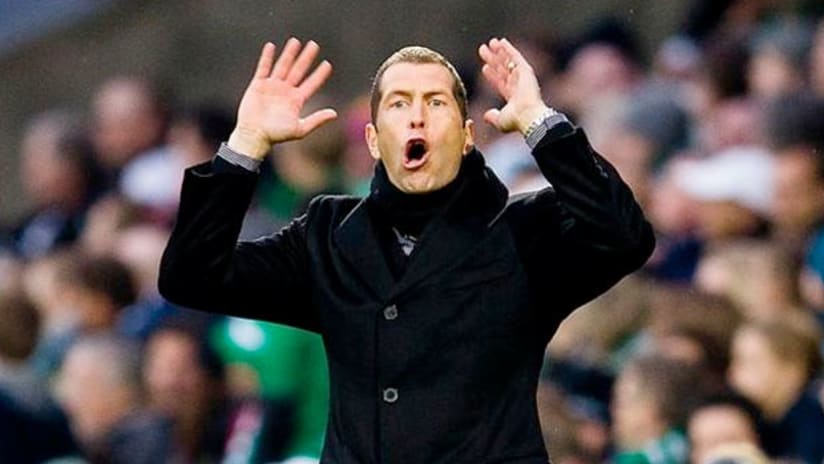STOCKHOLM, Sweden — Unlike 10 or 20 years ago, Americans playing professional soccer in Europe today are at worst a novelty, at best a non-story. From veteran stars like Clint Dempsey in England to young up-and-comers like Josh Gatt in Norway, the list of homegrown Yanks strutting their stuff is both bountiful and of decent quality.
But run down a list of the number of coaches we've exported to Europe, and only one name pops up: Gregg Berhalter. The 39-year-old ex-Galaxy defender just completed his first season as manager of Hammarby IF in Sweden's second division.

Running an established football club in Europe is largely unknown for an American, so it isn't too great of a leap to say that Berhalter is a pioneer, one who carries a weight on his shoulders. The line of reasoning would be that as this sole American's performance goes, so goes the perceived quality of our nation's footballing minds. But Berhalter chooses instead to simply focus on the task at hand, and not read into any greater implications.
"I don't see [being the only American manager in Europe] as pressure," Berhalter told MLSsoccer.com. "I just see it as doing a job. I put a lot of effort into it and a lot of preparation, and I don't associate me being an American with pressure. There's pressure with the job, because you're in Stockholm at Hammarby, a big club with intense fans, and they need to get promoted. But I don't think it's from being an American."
Sitting in a plush lounge at the Diplomat Hotel in downtown Stockholm, Berhalter hasn't changed much since he retired from the LA Galaxy in 2011. His hair is still close-cropped, and he looks fit enough to put in a solid defensive shift. In fact, he is wearing running gear, planning to go on a jog after the interview.
When answering questions, he is calm, thoughtful, and measured with his answers, as if he’s been doing this his entire life, or preparing to do this.
And perhaps that helps explain Berhalter's impressive performance in his first year. After Hammarby nearly suffered what would've been a catastrophic relegation to Sweden's third division in 2011, Berhalter nearly got Bajen promoted in 2012, thanks to a fourth-place finish that was just one spot shy of a promotion playoff.
But they didn’t make it. And Berhalter knows that the pressure is on to take Hammarby back up to Sweden's top flight in Year 2, especially considering the club will start playing in a new downtown stadium midway through the 2013 campaign.
One thing that might help that quest is more Americans in the club. Hammarby has a recent history of providing opportunities to young American players, including Charlie Davies, who starred from 2007 to 2009, and 2012 signings Billy Schuler and Baggio Husidic.
Charlie Davies: Hammarby goal machine
"I think that we represent an interesting concept for an American player that wants to go abroad," says Berhalter. "He can come abroad and play for an American coach. So you have the familiarity of that, and the communication level that comes with that, and then [Hammarby] represents a stepping stone for that player to then go to other leagues throughout Europe if they do well. Because we have scouts from Germany, Holland, England in our stands every week, as Sweden is a selling league."
While Berhalter is quick to say he'd welcome young Americans on the team, he doesn't feel that Swedish clubs are of a higher quality than those in MLS.
"MLS is better, I would say," he says. "I would say the top players in MLS are better than the top players in Sweden. Sweden is more of a selling league. But having said that, the Swedish games have a good structure to them. They're organized. They're tactically very good games."
Berhalter would know about MLS' quality of play, as he only hung up his boots after the 2011 season. Before that, however, he spent three seasons with 1860 Munich, which put him in the Bavarian city at the same time as the current US manager Jurgen Klinsmann, who was then manager of Bayern Munich. Berhalter knows Klinsmann through soccer circles, and thinks he is doing a good job, a point underlined by the Americans' impressive 2-2 road draw against Russia on Wednesday.
"I think [Klinsmann is] doing as well as anyone could be doing that hasn't really done it before and hasn't experienced what CONCACAF is all about," Berhalter says. "It's not easy and the dynamic with the US team — a lot of players playing abroad, and some playing domestically, with travel and going to these Central American countries on terrible fields — it makes it a challenge. It's something that as he goes through it again [in the Hexagonal], he's going to get a lot more comfortable with it."
Klinsmann has received a bit of criticism of late for getting away from the beautiful soccer he touted when initially taking the US job and relying on a more direct, physical style of play. But Berhalter doesn't think it's too late for the German legend to make good on his initial, finesse-oriented goals with the American side.
"I would say that he's probably seen that against some of these less physically imposing Central American opponents, it's more beneficial to play direct, so in that stage, qualifying is all about results," he says. "That's all that matters. You're not really trying to develop your style of play in those games, you're trying to get a result. But as you come closer to the World Cup, he'll have time to develop (a more attractive style) if that's what he truly believes in."

Berhalter — who was interviewed before the friendly against Russia — proved to be prescient, as the US did show much attacking verve in Krasnodar on Wednesday. Regardless of what style of play Klinsmann comes to rely on, however, Berhalter doesn't see the German legend having any trouble getting the US to Brazil in 2014.
"We're going to have difficulties, but we'll certainly go through [to the World Cup]," predicts Berhalter. "That's what it's about, right? It's about struggling a little bit, and then pulling it together and getting through. Because the games aren't easy and the conditions aren't easy, so it will be difficult. But we'll get through."
One player whose absence could hurt the United States' chances of qualifying for the 2014 World Cup is Berhalter's former Galaxy teammate, Landon Donovan. Donovan recently said he could walk away from the game very soon despite being just 30 years old. While this news is shocking, if not disappointing, for many US fans, Berhalter feels it's a decision that Donovan is justified in making.
"[Donovan is] young, but he's been doing it for a really long time," says Berhalter. "Only he knows the mental toll it's taken, and the physical toll it's taken, and only he knows when it's time to relax a little and take some time off. Other people might do something differently, but he knows if he's fully motivated to keep doing it. And if he's not, then he shouldn't do it."
The recently retired Berhalter, however, is quick to admit that he misses playing. He perks up when asked if he'd still like to be out on the pitch.
"Yeah, I do miss it," he confesses. "I didn't think I would that much, but it's something you've been doing so long. I miss competing, but it's gradually going away. But it's something I've been doing for a while, so ... "
The thought trails off and Berhalter seems to be left with a reflective moment. To fill the space, he's then posed arguably the worst question you can ask a professional athlete: What is it about your sport that you love? Ever game, Berhalter runs with it.
"What I like about soccer is that there's so many different ways to interpret it," says Berhalter. "You can watch soccer from all the different countries in the world and each has its different influence. I've been in four European countries, and the style is so different in every country, even though it's the same game. It's like a puzzle. You go to the country and you figure out, 'How do they do it here? What are they emphasizing here in their development?' It gives you so many challenges and so many different ways to solve problems and think of solutions. It's a fascinating game."
Even more fascinating when you’re the only American coaching in Europe.










